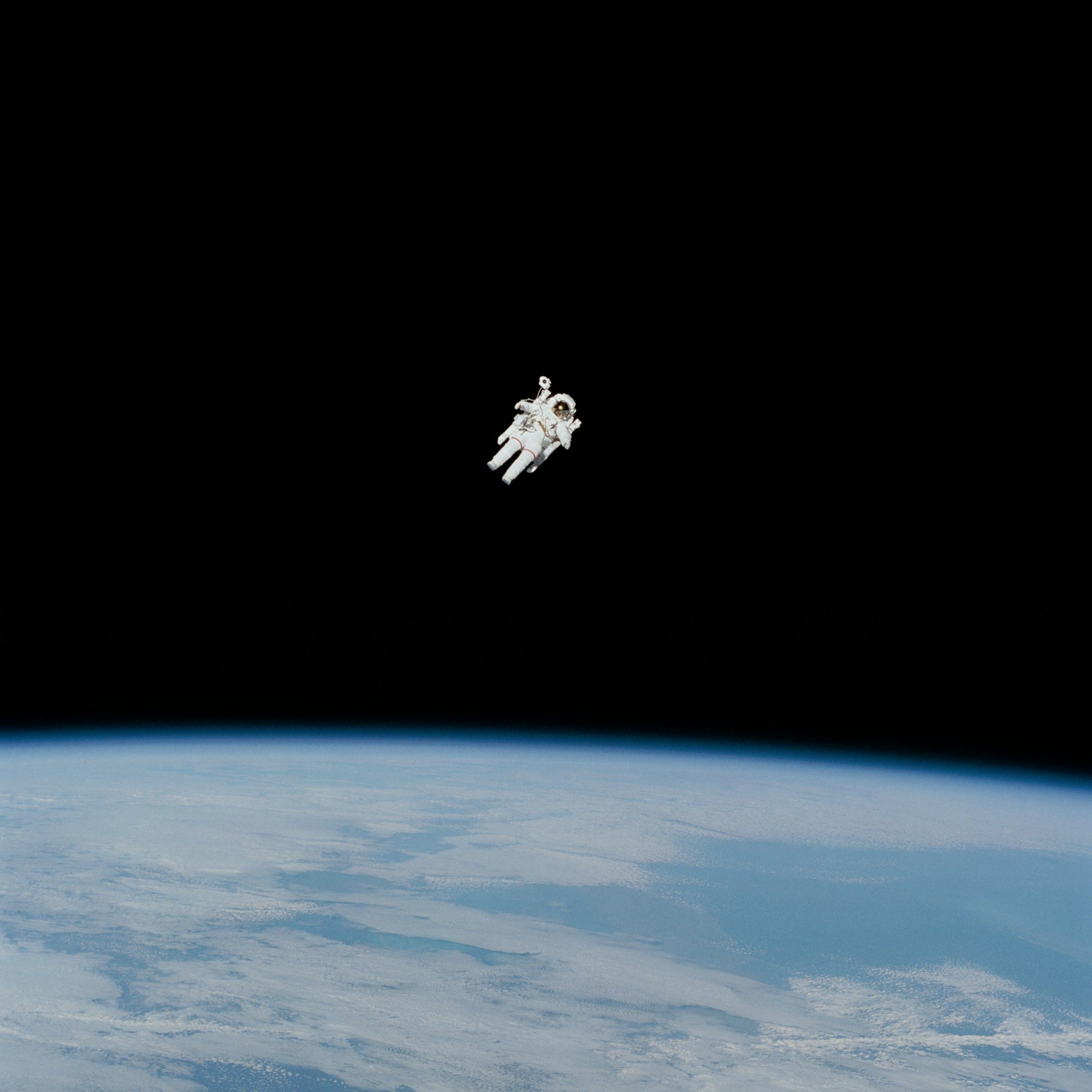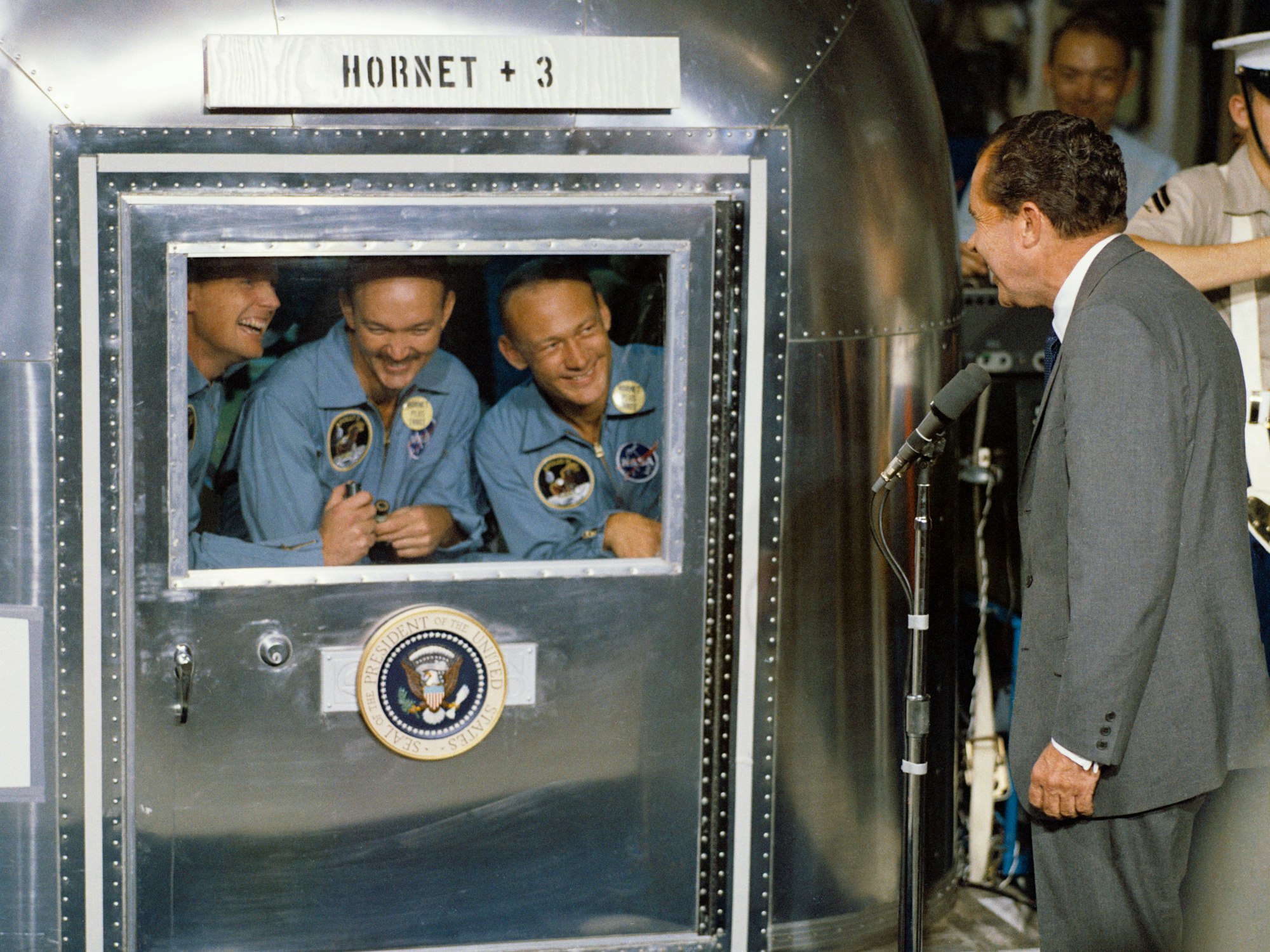
👨🚀 Astronauts are isolation pros. Here are their tips on how to handle it
A huge percentage of people around the world are living in isolation to reduce the spread of the coronavirus. It can be hard! Luckily, astronauts have tons of experience with isolation, and a few have chimed in with their expert advice.
Share this story!
Peggy Whitson
In a satellite interview with CBS This Morning, retired NASA astronaut Peggy Whitson, who broke the record for cumulative days spent in space back in 2017, talked about the topic of isolation. Peggy spent a total of 665 days in space. (Kind of makes a few weeks seem not so bad)
"Isolation is actually very doable, but its very important to interact well with the people your staying with and living with."
WATCH: @AstroPeggy, one of the most successful astronauts in American history, shares her advice for staying in during the #coronavirus pandemic: “You have to be able to communicate effectively... that is the most important thing you have to be able to do.” pic.twitter.com/m3mzy0BOsE
— CBS This Morning (@CBSThisMorning) March 23, 2020
She went on to detail compare our current situations with how astronauts live aboard the International Space Station and to offer tips for handling issues that arise in those isolated living situations.
"A lot of people are trying to work from home and trying to be parents from home and have a family at home and so it becomes very challenging," Whitson said. "But that's just like what we did on board the International Space Station. Our space station crew became our family in orbit and we had to not only work with them all throughout the day, but we couldn't go home at night. We stayed there on board the station and had to interact as well."
Whitson added that a major factor that helps astronauts to stay positive in their environment is "a higher purpose," or the greater meaning of their work. But, while astronaut's work helps to advance human knowledge and exploration, Whitson said that our current homebound situations have a higher meaning as well.
"COVID-19 gives us a higher purpose much like being in space does because we are saving lives by quarantining," she said. "It is important to understand that bigger purpose and to embrace that purpose to give you reason and rationale for continuing to put up with the situation."
Lastly, to those who are getting bored or restless at home, Whitson said that, on the space station, "I would do the extra work that I'd been thinking about doing." She suggested that people at home ask themselves, "What are the things that you would do if you had more time? Is it to read? Is it to maybe write poetry or do art? What is it that has been the thing that has been in the back of your head?"
Scott Kelly
Former NASA astronaut Scott Kelly, who made headlines with his involvement in the "Twins Study" while aboard the space station in 2015 and 2016, also offered some sage wisdom about isolation in an op-ed in the New York Times.
First, Kelly noted that his strict astronaut schedule (including sticking to a consistent bedtime) helped to keep him moving and motivated. "You will find maintaining a plan will help you and your family adjust to a different work and home life environment," he wrote. "When I returned to Earth, I missed the structure it provided and found it hard to live without."
However, he said that it's important to pace yourself so you don't get swallowed up by your work and to-do lists. "Take time for fun activities: I met up with crewmates for movie nights, complete with snacks, and binge-watched all of '"Game of Thrones'" — twice," he said.
While in space, obviously, Kelly didn't have the opportunity to pop outside for some fresh air, and he said he noticed the difference. "After being confined to a small space for months, I actually started to crave nature — the color green, the smell of fresh dirt, and the feel of warm sun on my face," he said, recommending that people find a way to step outside, move a bit and get some fresh air. "I appreciate that in our current predicament, I can step outside any time I want for a walk or a hike — no spacesuit needed. Research has shown that spending time in nature is beneficial for our mental and physical health, as is exercise," he added.
Speaking of suggestions on how to spend your time in isolation, Kelly recommended that people pick up hobbies like reading, playing instruments, making art and keeping a journal.
And he referenced the way astronauts on the space station stay connected with their friends and family back on Earth, videoconferences. He suggested setting up calls with friends and family to make sure that while we are staying safe and physically isolating, we're not distancing ourselves from relationships that can help us through the situation.
Chris Hadfield
Retired Canadian astronaut Chris Hadfield is no stranger to online videos. In a series of videos he made aboard the space station, Hadfield showed the world what it's like to live in space. He demonstrated how to wash your hands in space, how to brush your teeth in space and even how to make delicious food while in space.
He's at it again now, and on Saturday (March 21), he shared a video called "An Astronaut's Guide to Self-Isolation" on his personal YouTube page to help people figure out how to live their lives under these new pandemic-prompted circumstances.
"I've spent a little time self-isolating onboard a spaceship," Hadfield said. "You know, it's an extremely dangerous environment up on board the space station and yet, we find a way to thrive and be productive that far away from our normal lives."
Hadfield shared a four-step process that astronauts use to handle the isolation they face on the space station that people can apply to their lives now.
First off, he suggested that people do some research. "Understand the actual risk, don't just be afraid of things," he said. "Go to a credible source and find out what is truly the risk that you're facing right now — you, your family, your friends, the people that you care about."
Second, he suggested that people take a look at their goals. "What are you trying to accomplish? What are your objectives? What is your mission for right now?" he asks.
Third, he suggested that people address the constraints on those goals. "Who's telling you what you need to do? What financial resources do you have? What are your obligations?"
Fourth, and finally, he prompted people to take action. "Once you understand the risk and your mission, your sense of purpose and your obligations, then take action, start doing things," he said. "They don't have the be things that you always did before. Take care of family, start a new project, learn to play guitar, study another language, read a book, write, create. It's a chance to do something different that you've maybe not done before and then, repeat."
Hadfield added that there has never been a better time to self-isolate since so many people now have access to the internet, and with it a nearly limitless abundance of information and of things to read and enjoy.
"Take care of yourself, take care of your family, take care of your friends, take care of your spaceship," he said. "I wish everybody happy landings."
Anne McClain
In a recent Twitter thread, current NASA astronaut Anne McClain shared the kind of skills every NASA astronaut has to learn called “Expeditionary Behavior,” or EB for short.
1/ One thing astronauts have to be good at: living in confined
— Anne McClain (@AstroAnnimal) March 22, 2020
spaces for long periods of time. Find yourself in a similar scenario? Here are
some pro tips...a thread.
“Good EB” is all about “talking so you are clearly understood” and actively listening, according to McClain.
You also have to learn how to become a leader by enhancing “the group’s ability to execute its purpose through positive influence.”
Astronauts also have to learn how to take good care of themselves, “including hygiene, managing time and personal stuff, getting sleep, and maintaining mood.”
“To practice good Group Living EB, cooperate rather than compete,” McClain wrote. ” Actively cultivate group culture. Respect roles, responsibilities and workload. Take accountability; give praise freely.”
Buzz Aldrin
Buzz Aldrin also knows a thing or two about quarantine. When he returned from the Moon in 1969 with Neil Armstrong and Michael Collins, the trio spent 21 days in quarantine to prevent the spread of any contagions they might have brough back from the lunar suface.

After the Apollo 11 Command Module landed in the Pacific Ocean, the three lunar astronauts were ushered from their life raft onto the USS Hornet aircraft carrier. Once aboard the ship, they immediately went into a converted Airstream trailer known as the mobile quarantine facility. This trailer was flown by a C-141 aircraft to Houston, where the crew subsequently spent about three weeks inside a "secure" building known as the Lunar Receiving Laboratory.
Ars Technica's Eric Berger actually had an opportunity to speak with Mr. Aldrin by telephone amidst the coronavirus outbreak. Having just turned 90 in January, Buzz is in the highest of risk categories for COVID-19. He is at home, hunkering down, and doing fine.
When Eric asked what Buzz is doing to protect himself from the virus, his response was quick and to the point.
"Lying on my ass and locking the door."
Sage advice from a American hero.